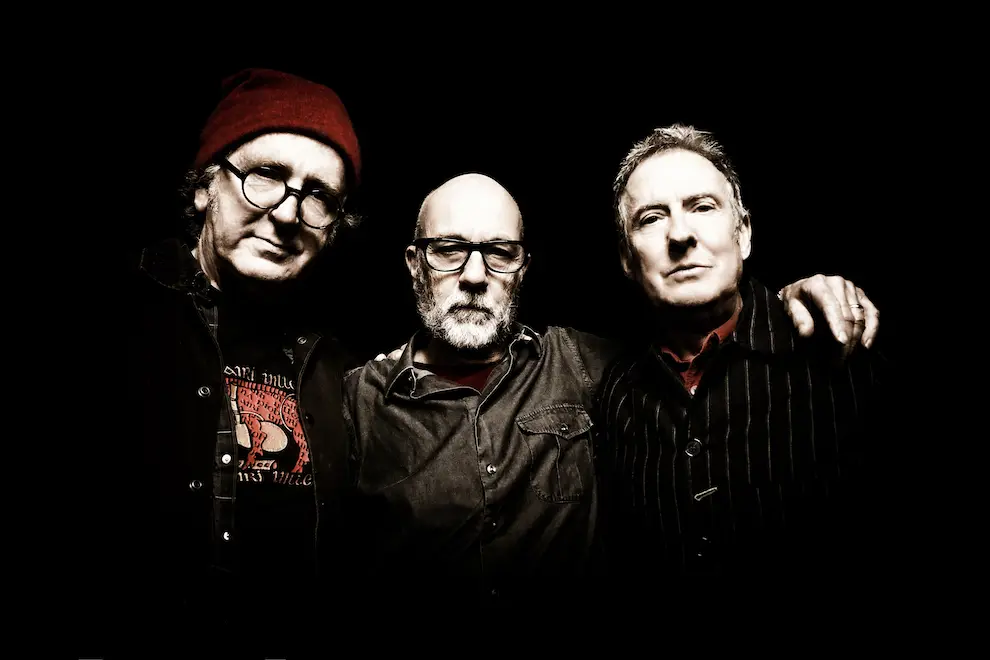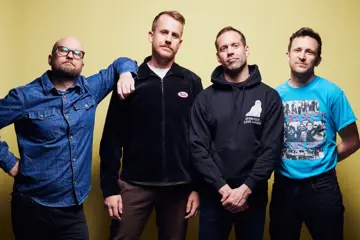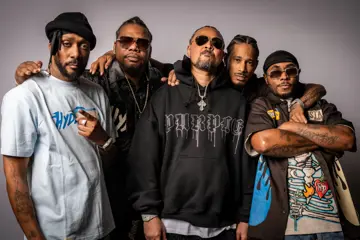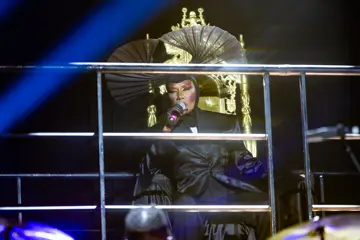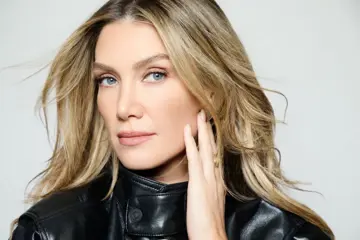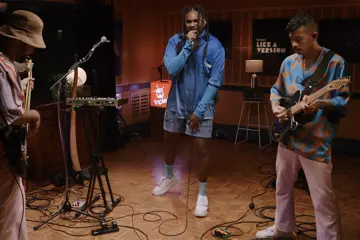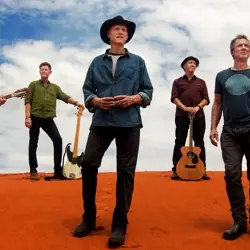 Midnight Oil
Midnight OilIn 2022 the great Midnight Oil farewelled the world as a live entity with a series of huge concerts all around the globe, the rapturously-received gigs befitting their status as one of Australia’s finest ever rock bands.
With their time together spanning 50 years at the coalface, the Oils left behind 13 albums which in total have sold over 20 million copies, but just as important as the killer music was the messaging within their lyrics and the unwavering conviction of the band’s collective moral compass.
The Oils introduced generations of young Aussies to issues that they as a band felt passionate about, whether those matters be be anti-nuclear, environmental, Indigenous or any of the other societal issues that they felt compelled to shine a light on, back in a time when dissenting voices to the national discourse were few and far between.
But for Midnight Oil’s founding drummer – and one of their principal songwriters – Rob Hirst, his band’s farewell wasn’t so much the end of the road as much as it was the gateway to new opportunities.
Don't miss a beat with our FREE daily newsletter
Still clearly vexed by the many issues facing Australia as a society the songs just kept flowing, and to bring them to life he tapped fellow Midnight Oil alumni Jim Moginie – not only his musical foil but also his lifelong friend – as well as respected drummer Hamish Stuart.
The first result of this new musical partnership – which they’ve simply tagged Hirst, Moginie & Stuart – is the four-track Red Continent EP, a bunch of songs which, unsurprisingly, cover very similar conceptual terrain to the Oils in a manner that’s just as thought-provoking and compelling.
“Obviously Jim and I have been working together for about 50 years can you believe it, we met when we were 15,” Hirst offers with a wry smile. “Jim Moginie produces everything, he’s a great writer – there’s nothing that man can’t do – so with these four new songs, which are my songs, I thought ‘I could do them myself again, or how about if Jim and I did it?
“And how about I don’t play drums for the first time, I just strum my old Martin acoustic and sing, and we’ll do it all live and I’ll get the drummers’ drummer Hamish Stuart to come in and play, because he’s a great friend of ours?’
“So whenever Jim had a moment and Hamish had a second over the last 18 months we met and I’d just run the song a couple of times, and Jim and Hamish would immediately pick up the thread and the song would form in minutes. Then we’d just play it all live, and Jim might add a little bit of keyboard or guitars or some backing vocals afterwards, but that was pretty much the song.
“It was really easy to do, and when you’re working with people who’ve got such an incredible history you never have to second guess them or explain anything, it’s really quite a joy.”
The musical chemistry between Hirst and Moginie was evident from the outset, tracing back to their initial chance meeting during their schooldays.
“I was so lucky to meed Jim when I was in my mid-teens, and from that very first day I went up there to meet him I think we started writing songs together, right from the get-go,” Hirst marvels. "He’s got such a lovely bedside manner; he can sort the wheat from the chaff and do it in the nicest manner. Because musicians are pretty thin-skinned, so you want to work with people who are really gentle – if you come up with bad ideas, they let you down gently.
“We’ve made a really good writing team I think over the years, and I guess with the songs on the Red Continent EP some of them – if the Oils were still going – could easily have ended up as Midnight Oil songs, but as it is I think they turned out really well in this slightly different form.
“You’ve just got to write without pre-judgement or thinking about where it will go. In my opinion the best songs are the ones which are recorded really quickly: the first and second ideas are usually the best, and if you start labouring over it it sounds a bit contrived or over-produced, so you move onto something else. But with these four songs they just went down really quickly, and then we got back into the Irish coffees and chat, made it a social occasion.”
Keeping time for the powerhouse ex-Midnight Oil skinsman is essentially the Australian equivalent of being the drummer in the Foo Fighters, but Hirst explains that Stuart has been completely unperturbed at the prospect.
“I don’t think he’s phased at all,” he chuckles. “I think Hamish is one of the most amazing drummers we have in Australia. Not many people know him because he mainly works sessions, but in Hamish’s case most recently he’s been out with Don Walker, but there’s hardly an accomplished musician in Australia that he hasn’t played with at some point.
“And he’s got his own interesting hieroglyphics. When I write a song with him, he uses these hieroglyphics that only he can understand; he writes down all of the short bar changes or anything surprising in the arrangement, and then when we play it it’s perfect because he’s got this special code that only he understands.
“But I don’t think he’s phased at all about playing with me. We’re quite different players, but the thing with Hamish is that he can play jazz, he can play blues, he can play rock – he can play anything.”
And while it’s not completely novel hearing Hirst taking on frontman responsibilities – he played a similar role in his band The Ghostwriters throughout the ‘90s and ‘00s between responsibilities with the Oils – to him it’s more about just getting amongst it with his mates.
“It’s all about my love of collaboration,” he admits. “I’ve done countless collaborations over the journey, and I often think it’s the most enjoyable way of making music and the most productive way of making music.
“The thing is if I’ve got a good song and I take it to Dom Turner from The Backsliders – or my daughter Jay who lives in Tennessee or I take it to Jim Moginie, or perhaps Paul Greene who I did an album with some years ago as well – then each of those people take the song and they push it in their own direction. The song remains the song, but it can be jazzier or folkier or rockier or whatever.
“It’s all about the collaboration, and collaborating with Jim – as I was saying – is something that I’ve been doing for many decades. I don’t know if the three of us will make any more songs together, but these four songs are really good illustrations of each of our talents ,and put in a way that hopefully serves the songs and does the songs justice.”
Hirst was kind enough to life the lyrical veil for The Music, and explain some of the themes running throughout the Red Continent EP:
Red Continent
RH: “It sounds a bit predictable, but after three years of soaking rains and floods down the east coast of Australia, it looks like we’re in for an El Niño event now. Remember the last time the Darling River – or the Baaka we should call it – was filled with millions of dying fish and reduced to a series of ponds, the once mighty river system that once had riverboats all the way up is dying, and this has happened on our watch. It’s largely to do with the greed of water extraction from a river that can’t take it anymore, in a period of increasing droughts and add climate change on top, so I was drawn to write something along those lines.
“But now coming out of a Northern Hemisphere fire season which has been the worst on record – with record temperatures in Greece and Northern Africa and Canada – I think everyone is just waiting with bated breath about what’s going to happen here on the driest of all continents given all of these factors. It’s not fiction anymore, it’s happening right now.
“And with the line “catching falling knives”, the fireys were right in the middle of uncontrollable firestorms and the heat generated is such that they can’t even get near it, and I remember the embers being described as “like catching falling knives” – fires which were miles away, but because of the winds and the ferocity were falling down on them before they’d even seen the fire.
“Sadly after years of denial by Coalition politicians and others we still poor millions of dollars into fossil fuel industries, making it worse, and we still don’t recognise our great treasure of the Great Barrier Reef which has suffered multiple bleaching events – it’s all happening in a very short amount of time now, we’ve got to wake up.”
Little Bits Of Wire
RH: “It’s about my Dad, but it’s also about his whole generation as well. They were children of the Depression, and then many of them went to war – Dad was a serviceman and went to New Guinea – and they brought back with them whatever they’d seen, although Dad like most of the Diggers would never talk about anything like that. They call it the ‘Silent Generation’.
“The other thing about that generation, though, was that they were incredibly resourceful – they never wasted anything, never threw anything out, never hired a tradesman to do anything – so myself and my brothers used to laugh that our whole house was held together by little bits of wire. He would fix anything: he’d turn himself into a plumber, a sparky and a chappie, he just did everything. Fairly inexpertly though, I’d have to say… sorry Dad.”
No Longer Shadows
RH: “I was thinking about how it’s the year of the Voice, and Midnight Oil are very big ‘vote yes’ supporters, in fact we had the Uluru Statement From The Heart up behind the band for the full duration of our European and United States international tour, in all its glory. It’s a magnificent document, and – like a lot of people – we’ve been banging on about this for a long time, but right now in the year of the Voice its of even more importance than usual. I thought, ‘when was the last time we had that kind of decision?’, and of course it was 30 years ago with Mabo.
“And it’s interesting, the same fear merchants were pushing equally hard against those magnificent changes that Mabo brought in, not just for First Nations people but for the self-esteem and the confidence of all Australians. And it’s now happening again for political reasons, by people who just want to enhance their political career but are using this incredible opportunity to move forward as a country, along with First Nations people.
“If you’ve been around for a while it does feel like history repeating, but we’re confident that people’s good hearts and understanding of what’s being asked – which is simply a request to consult with Aboriginal people on affairs which affect them – it’s such a small and humble request from people that have had such a shocking time for the last 240-odd years in this country.”
The Strongest Memory
RH: “‘The faintest ink is better than the strongest memory’ is an old parable, and the song is about whistleblowers. Australia has a shocking history at protecting our whistleblowers – whether they’re blowing the whistle on war crimes in Afghanistan, whether they’re blowing the whistle on the illegal bugging of East Timor to obtain a commercial advantage with the oil revenues from the Greater Sunrise in the Timor Sea.
“But what’s been happening is that it’s the whistleblowers who’ve been dragged through the courts, while the people who have actually been committing the crimes seem to face no recriminations. These whistleblowers have basically sacrificed their careers and livelihoods to bring these things to our attention. So the song is about the gulf between people’s faulty memories and the facts of what actually happened with some of these events.”

